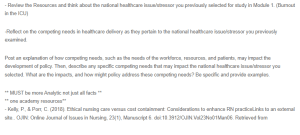Discussion – Organizational Policies and Practices to Support Healthcare Issues
Competing needs within healthcare systems, such as balancing workforce demands, resource allocation, and patient care quality, often create ethical dilemmas for nurse leaders. The national healthcare issue of burnout in the ICU highlights these challenges vividly. Burnout, characterized by emotional exhaustion, depersonalization, and reduced personal accomplishment, not only affects the well-being of healthcare providers but also compromises patient care quality. Effective policy development must address these competing needs to ensure sustainable solutions.
In developing healthcare policies there is a conflict between the interest of the healthcare workforce and the interest of patients. For instance, working 12-hour shifts is an acceptable solution for retaining nurses by giving them more days off. However, this approach results in higher fatigue, which has been associated with high levels of clinical errors (Haddad et al., 2023). Also, a study by Haddad et al. (2023) revealed that nurses with extended duty hours of more than twelve hours were 30% more predisposed to medication errors compared to nurses doing shorter shifts, implying the consequences on patient safety. Therefore, although extended hours of work might have direct positive impacts on the staff scheduling requirements, this may lead to adverse effects on patient safety, making staffing a question of the classic conflict between two evils.
Specific issues of competing needs relevant to ICU burnout include the need for sufficient staffing in the ICU, the fiscal realities of healthcare organizations, and the need to maintain quality patient care. As per a survey conducted by Kelly et al. (2020), 78% of ICU nurses experienced burnout, and almost half of them aimed to quit their jobs because of the burden of the work. These statistics underline the role of staffing policies that should be balanced and sustainable in terms of available funding. Due to the financial limitations in most organizations, additional staff or augmentation of intensive mental health support for the ICU staff results in overstretched and stressed nurses. This situation may lead to a cycle where burnout increases the turnover, which puts the rest of the staff under pressure, decreasing the quality of services rendered (Kelly & Porr, 2023).
To accommodate these rival demands, the respective policies need to be complex and based on the best practices. For instance, rather than going for long shifts, nurse leaders can implement flexible working, which provides adequate staffing without incurring fatigue. Besides, a pilot program by Dousin et al. (2021) showed that implementing flexible schedules reduced nurse turnover by 25% and decreased reported burnout rates by 15%. Further, policies should involve the incorporation of mental health services appropriate for ICU employees to reduce burnout.
Moreover, policy development should ensure the direct involvement of nurses since this helps improve job satisfaction and decrease the level of depersonalization associated with burnout. A study by Filipska-Blejder et al. (2023) found that involving nurses in policy formulation led to a 20% increase in job satisfaction and a 10% decrease in burnout symptoms. Leaders should involve the frontline staff in the formulation of the policies to ensure they achieve the best balance between the organization and the workforce so that sustainable options can be implemented in healthcare delivery.
In conclusion, ultimate solutions for addressing the problem of burnout in the ICU should be seen from the aspect of identifying priorities for the workforce, resources, and patient outcomes. Health policies should, therefore, be formulated to meet these needs and involve scientific and professional approaches to provide efficient and effective policies for society.
References
Dousin, O., Wei, C. X., Balakrishnan, B. K. P. D., & Lee, M. C. C. (2021). Exploring the mediating role of flexible working hours in the relationship of supervisor support, job and life satisfaction: A study of female nurses in China. Nursing Open, 8(6), 2962–2972. https://doi.org/10.1002/nop2.1008
Filipska-Blejder, K., Antczak-Komoterska, A., Kostecka, M., Haor, B., Królikowska, A., Jabłońska, R., Grzelak, L., Wysokiński, M., Fidecki, W., Wiśniewski, A., & Ślusarz, R. (2023). Burnout Levels in Nurses and Associated Factors during the COVID-19 Pandemic—A Cross-Sectional Study. Healthcare, 11(14), 2032. https://doi.org/10.3390/healthcare11142032
Haddad, L. M., Butler, T. J. T., & Annamaraju, P. (2023). Nursing shortage. National Library of Medicine; StatPearls Publishing. https://www.ncbi.nlm.nih.gov/books/NBK493175/
Kelly, L. A., Gee, P. M., & Butler, R. J. (2020). Impact of Nurse Burnout on Organizational and Position Turnover. Nursing Outlook, 69(1), 96–102. https://doi.org/10.1016/j.outlook.2020.06.008
Kelly, & Porr. (2023). Ethical Nursing Care Versus Cost Containment: Considerations to Enhance RN Practice | OJIN: The Online Journal of Issues in Nursing. Nursingworld.org. https://preprodojin.nursingworld.org/table-of-contents/volume-23-2018/number-1-january-2018/ethical-nursing-cost-containment/
ORDER A PLAGIARISM-FREE PAPER HERE
We’ll write everything from scratch
Question 
– Review the Resources and think about the national healthcare issue/stressor you previously selected for study in Module 1. (Burnout in the ICU)

Organizational Policies and Practices to Support Healthcare Issues
-Reflect on the competing needs in healthcare delivery as they pertain to the national healthcare issue/stressor you previously examined.
Post an explanation of how competing needs, such as the needs of the workforce, resources, and patients, may impact the development of policy. Then, describe any specific competing needs that may impact the national healthcare issue/stressor you selected. What are the impacts, and how might policy address these competing needs? Be specific and provide examples.
** MUST be more Analytic not just all facts **
** one academy resources**
– Kelly, P., & Porr, C. (2018). Ethical nursing care versus cost containment: Considerations to enhance RN practiceLinks to an external site.. OJIN: Online Journal of Issues in Nursing, 23(1), Manuscript 6. doi:10.3912/OJIN.Vol23No01Man06. Retrieved from
